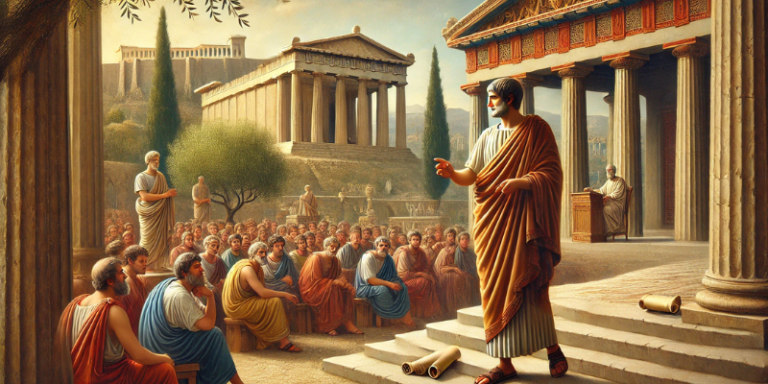Aristotle, often regarded as one of the most influential philosophers in Western history, made significant contributions to political thought. His political theory, largely captured in his seminal work, Politics, remains foundational in the study of citizenship, justice, and governance. Aristotle’s understanding of the state, his vision of justice, and his analysis of different political systems have been deeply influential in shaping the discourse around political science, particularly in relation to the nature of human beings as political animals. This article seeks to explore key elements of Aristotle’s political theory, examining its relevance and influence in both ancient and modern contexts.
1.0 The Concept of the Polis
At the heart of Aristotle’s political theory lies the polis (city-state), which he considered the natural and highest form of human association. Aristotle posited that human beings are inherently political creatures, describing them as zoon politikon, meaning that humans naturally seek community and governance (Aristotle, 1992). He believed that individuals could not achieve their full potential outside of a political community, and it is within this community that they could lead the good life (eudaimonia). The state exists not only to ensure the survival of its citizens but also to promote their moral and intellectual well-being.
Aristotle’s conception of the state was grounded in his belief that politics is a teleological process, meaning that the state exists for a purpose – the ultimate good of its citizens. For Aristotle, the state is a creation of nature and emerges from the organic growth of smaller associations, starting with the family and expanding into the village, and ultimately forming the polis (Kraut, 2002). The polis, therefore, is seen as the ultimate expression of human association, allowing individuals to flourish by engaging in political participation and deliberation.
2.0 Citizenship and Political Participation
A central aspect of Aristotle’s political theory is his concept of citizenship. Unlike modern views of citizenship, which often emphasise rights and protections under a state, Aristotle’s notion was heavily focused on duties and active participation in public affairs. In Politics, Aristotle defines a citizen as someone who shares in the administration of justice and the holding of public office (Aristotle, 1992). He strongly believed that the primary duty of a citizen was active engagement in politics, and those who did not participate in public life were not truly citizens. For Aristotle, political engagement was not a choice but a moral obligation.
Furthermore, Aristotle linked the idea of citizenship with the concept of justice. In his view, the role of the citizen was to contribute to the realisation of justice within the political community. Justice, for Aristotle, is giving each person what they are due, based on their merit and their contribution to the common good (Miller, 1995). He made a distinction between distributive justice, which involves the fair allocation of resources, and corrective justice, which addresses wrongs and ensures fairness in transactions. For Aristotle, the just state is one that seeks to promote the common good and allows for the flourishing of all its citizens.
3.0 Constitutions and Types of Government
In his classification of political systems, Aristotle identified six forms of government, divided into good and bad forms based on whether they served the common interest or the interest of the rulers. The good forms of government included monarchy, aristocracy, and polity, while the corrupt forms were tyranny, oligarchy, and democracy (Aristotle, 1992).
Monarchy, according to Aristotle, is the rule by one person in the interest of the common good. However, it could degenerate into tyranny if the ruler governs for personal gain. Similarly, aristocracy, the rule of a few virtuous individuals, could deteriorate into oligarchy, where the wealthy minority governs to their own benefit. Polity, which Aristotle favoured, represents a mixture of democracy and oligarchy, where both the rich and the poor share in governance. Democracy, which Aristotle viewed critically, was seen as a form of government where the majority, often the poor, rule in their own interest, rather than the common good.
Aristotle’s preference for polity reflects his belief in a balanced government, where power is shared and where the middle class, representing a median between the extremes of wealth and poverty, plays a stabilising role (Kraut, 2002). He argued that the middle class is the best suited to govern because they are less likely to be swayed by the interests of the rich or the poor.
4.0 Justice and the Common Good
Central to Aristotle’s political theory is the concept of justice, which he believed was essential to achieving the common good. In his view, justice is not merely a legal concept but a moral one. It is closely linked to virtue, and the just state is one that promotes the virtuous life for its citizens (Miller, 1995). Aristotle identified two forms of justice: distributive and corrective. Distributive justice relates to the fair allocation of goods and honours within the political community based on merit, while corrective justice focuses on rectifying wrongs and ensuring fairness in transactions between individuals.
The promotion of justice, according to Aristotle, is the primary aim of the political community. A well-ordered state is one that ensures the well-being of all its citizens, not merely a select few. Aristotle’s concept of justice emphasises proportional equality, where individuals receive rewards in accordance with their merit and contribution to the state (Aristotle, 1992). The idea of the common good, therefore, is central to Aristotle’s vision of a just state.
5.0 Aristotle’s Influence on Modern Political Thought
Although Aristotle’s political theory was developed in the context of the ancient Greek city-state, its influence on modern political thought cannot be overstated. His ideas on the nature of the state, citizenship, and justice have shaped the development of political philosophy in the Western tradition. For example, the notion of the state as an institution aimed at promoting the common good continues to influence contemporary debates on the role of government.
Moreover, Aristotle’s classification of political systems has provided a framework for understanding different forms of government, and his emphasis on the middle class as a stabilising force resonates with modern democratic theory (Mulgan, 1977). Aristotle’s concept of justice, particularly distributive justice, remains a central concern in contemporary discussions about social justice, fairness, and equality.
Aristotle’s political theory offers a profound and comprehensive vision of human nature, the state, and justice. His belief that human beings are naturally political animals, his emphasis on active citizenship, and his analysis of different forms of government have made lasting contributions to the field of political science. While his ideas were shaped by the context of the ancient Greek polis, they remain relevant to contemporary discussions about the role of the state, the nature of justice, and the responsibilities of citizens. Aristotle’s political theory continues to be a vital resource for understanding the complexities of governance and the pursuit of the common good.
References:
Aristotle (1992) The Politics. Translated by T. A. Sinclair. London: Penguin Books.
Kraut, R. (2002) Aristotle: Political Philosophy. Oxford: Oxford University Press.
Miller, F. D. (1995) Nature, Justice, and Rights in Aristotle’s Politics. Oxford: Oxford University Press.
Mulgan, R. G. (1977) Aristotle’s Political Theory: An Introduction for Students of Political Theory. Oxford: Clarendon Press.









